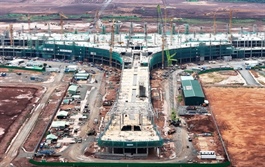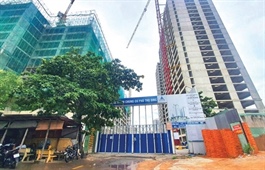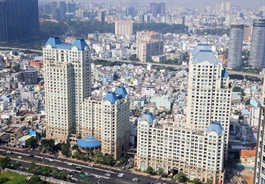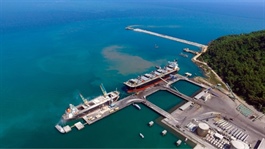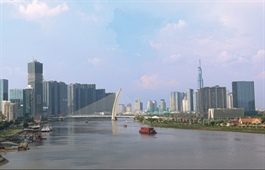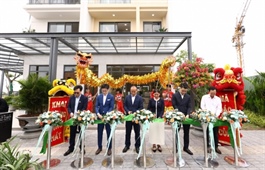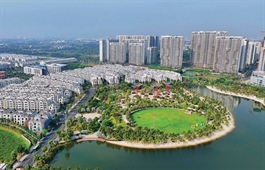Real estate heats up with major deals
Real estate heats up with major deals
Driven by mounting liquidity pressures and strategic repositioning, Vietnam’s real estate market witnessed a marked increase in large-scale asset transfers during the first half of the year.
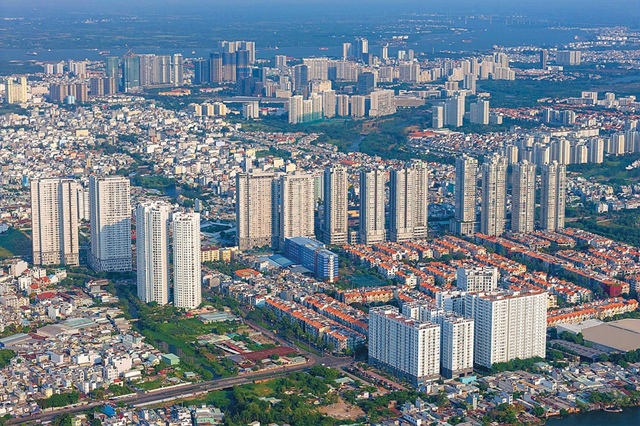
Real estate heats up with major deals |
In June, VietinBank announced it was undertaking procedures to transfer ownership of its landmark VietinBank Tower project, located in the Nam Thang Long urban area of Hanoi, with an asking price of approximately $400 million.
The bank had been inviting investors with sufficient financial capacity and relevant implementation experience to engage for further details and transaction procedures.
The development occupies nearly three hectares and comprises two high-rise towers of 48 and 68 storeys. One tower was initially intended to house VietinBank’s headquarters, while the other was planned as a 5-star hotel featuring wellness amenities and high-end serviced apartments.
Despite a total investment exceeding $400 million and construction commencing in 2010, the project remains unfinished due to various challenges faced by the local bank.
According to Phan Xuan Can, a real estate merger and acquisition (M&A) expert based in Hanoi, VietinBank’s move aligns with several new advantages in the current market, including low interest rates, improved real estate liquidity compared to last year, and growing investor appetite.
“In addition, the government is pushing ahead with public investment, which makes this an opportune moment for VietinBank to bring the project to market,” Can told VIR.
However, Can emphasised that given the project’s size, commercial land use, and product mix, a well-capitalised investor with a long-term outlook would be required. Ideally, such a buyer would intend to use 50–60 per cent of the office space themselves for the deal to be viable.
On July 3, Hanoi Anpha Real Estate Exchange announced its acquisition of over 48.4 million shares, equivalent to a 23.06 per cent stake, making it a major shareholder in Vinaconex Tourism Development and Investment. The transaction was valued at approximately $94 million.
The company is the developer of Cat Ba Amatina in Haiphong, a 170-hectare coastal urban tourism complex originally envisioned more than a decade ago. Despite its prime location and natural landscape, the venture has yet to materialise and has now changed hands.
Earlier in the year, during the first quarter, Gateway Thu Thiem JSC, a member of Huong Viet Holdings, acquired a 42 per cent stake in Nam Rach Chiec Company, the developer of Palm City in Ho Chi Minh City, from Singaporean real estate group Keppel. The deal was worth $104 million.
Palm City is a 30-hectare mixed-use urban development located along the parallel road at the entrance to Ho Chi Minh City-Dau Giay Expressway.
On the seller side, in the second quarter, Vinhomes transferred a 25-hectare subdivision within Vinhomes Ocean Park 3 New Urban Development Area in Van Giang of Hung Yen province to Singapore-based CapitaLand.
CapitaLand plans to develop nearly 700 low-rise units across two phases of 342 and 350 units respectively, under the project name The Fulton, with a total expected investment of around $800 million.
Despite strong fundamentals, the real estate M&A market has yet to reach a true breakthrough, owing to several ongoing obstacles.
The first, according to expert Can, is legal uncertainty. While both central and local governments have made efforts to streamline regulatory frameworks, many projects continue to face procedural bottlenecks, limiting the volume of transactions.
“In practice, buyers are highly selective. They want projects with basic legal clarity, relatively clean land, or those that can be cleared in an acceptable timeframe. Many are also waiting for clearer outcomes from ongoing administrative boundary and governance reforms across provinces and cities,” Can explained.
Secondly, pricing remains a significant hurdle, with many sellers quoting inflated valuations during negotiations. “Some developers assume land prices will continue to rise and thus set excessive expectations – what you might call a case of ‘price delusion’. But they forget buyers face significant costs and time commitments to turn these projects into viable products. Successful deals have occurred when sellers are realistic and factor in buyer profitability,” Can added.
Moreover, most M&A activity in 2025 has so far focused on urban residential developments. Other segments remain subdued.
“Office and hotel assets are only thriving in large cities like Hanoi and Ho Chi Minh City. Industrial real estate has slowed due to countervailing US tariffs, with investors pausing to reassess. The hospitality sector is still in recovery mode, not yet vibrant enough to drive big-ticket deals,” Can noted.
Nonetheless, he remains optimistic about the outlook for the rest of 2025, as legal bottlenecks are gradually being addressed, capital availability is improving, and overall market sentiment is strengthening.
“Urban residential real estate is expected to continue leading M&A activity over the next six months. However, there is cautious hope that other asset classes may begin to catch up. This year is likely to be better than the last,” Can said.
- 11:21 31/07/2025








